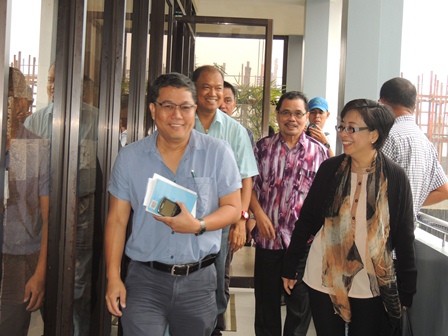BTC steps up study of options for future Bangsamoro region
- Details
- IAG Philippines

COTABATO CITY -- The Bangsamoro Transition Commission is leaving no stone unturned as it seeks to draft into law the gains of the peace talks between the Philippine government and the Moro Islamic Liberation Front (MILF).
All 15 commissioners of the BTC together with their legal staff, executive assistants and researchers explored the intricacies of the ministerial form of government and electoral systems in a seminar in Cotabato City on August 12 to 13, 2013.
This development comes even if the Framework of Agreement on the Bangsamoro signed in October 2012 awaits consensus on two more annexes: the Annex on Power Sharing and the Annex on Normalization.
Consensus on the remaining annexes will mean completion of the whole peace package bringing BTC’s task to full throttle.
IN PHOTO: Institute for Autonomy & Governance Director Benedicto Bacani and GPH Peace Panel Chair Miriam Coronel-Ferrer in one of the study sessions in Cotabato City. Bangsamoro Transition Commission Chair Mohagher Iqbal is seen at the back.
The first two annexes to be signed are the Annex on Transitional Modalities and Arrangements (February 27, 2013) and the Annex on Wealth Sharing (July 13, 2013). The whole peace agreement will guide the BTC in the drafting of the Basic Law that will be forwarded to Congress for approval.
Once it finds legislative favor, the law will see the entrenchment of a new autonomous political entity to be called Bangsamoro, one that will replace the Autonomous Region in Muslim Mindanao (ARMM). This entrenchment may happen in as early as 2016.
At the seminar in Cotabato City, BTC Chairman Mohagher Iqbal hopes the knowledge and information imparted by the resource persons will help commissioners face up to the complexities of their task.
Dr. Jose V. Abueva, former University of the Philippines president and professor emeritus of political science, lauds the mandate of the Transition Commission as a “grand opportunity” to design a new Organic Act paving for a new political system and structure.
“What you can accomplish in the Transition Commission…if you can achieve genuine regional and local autonomy and a just system, it will be beneficial for the whole country,” Prof. Abueva added.
Prof. Abueva delivered a rousing talk on Philippine politics, with focus on the Framework Agreement on the Bangsamoro, addressing the constitutional question on the feasibility of a ministerial form of government for the Bangsamoro alongside its options for electoral system.
Political Scientist and Konrad Adenauer Foundation (KAS) Resident Representative in the Philippines Dr. Peter Koeppinger discussed at length these options and how each could impact on inclusiveness and stability of democratic institutions in a ministerial form of government.
READ: Options for different electoral systems in the future Bangsamoro region
Ms. Cristita Giangan, KAS program manager, lectured on the preconditions, advantages, challenges and mechanisms of the ministerial form of government.
POWERPOINT: Introduction to the ministerial form of government
Synthesizing the discussions, Institute for Autonomy & Governance Executive Director Benedicto Bacani emphasized that the policies and details reflecting the ministerial form of government the BTC will come up in the Basic Law must promote stability and cohesiveness in the future Bangsamoro region.
He also urged the commissioners to look closely into the interrelationships among the regional government, local government units, and the central government in Manila. He added that the new law must also expand democratic space by promoting an environment conducive to the formation of genuinely principled political parties.
IAG, in partnership with the BTC secretariat, facilitated the seminar with KAS as the major sponsor.
The Germany-based Konrad Adenauer Foundation (KAS) undertakes non-profit work on political party building and political reforms in the Philippines.
IAG is an independent think tank based in Cotabato City focusing on making local autonomy and good governance effective vehicles for peace and development in the southern Philippines. – iag.org.ph

